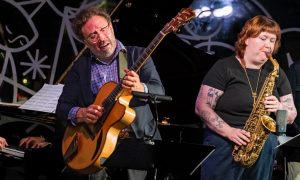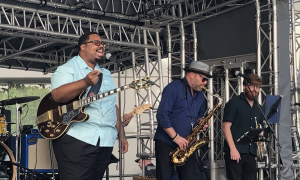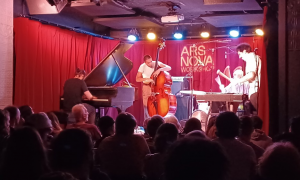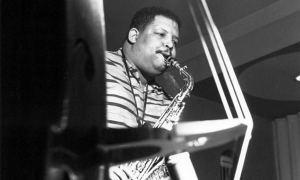Home » Jazz Articles » Live Review » Birth of the Cool at 75: A Philadelphia Premiere at the Clef Club
Birth of the Cool at 75: A Philadelphia Premiere at the Clef Club
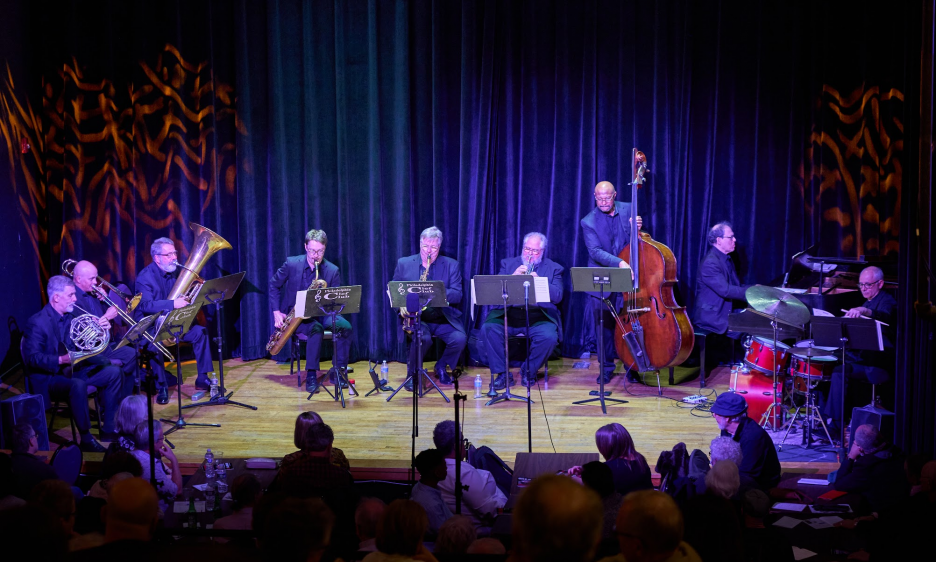
Courtesy Susan Torello
Philadelphia Clef Club of Jazz and Performing Arts
Birth of the Cool: A Philly Premiere, 75 Years Later
Philadelphia, PA
March 29, 2023
The advanced publicity for this exciting historically-based concert must have hit the pleasure centers of many fans, as it sold out on the second day after tickets became available. Was the rush to the box office the result of the cult-like status of the Birth of the Cool (Capitol, 1957) album, the prominence of the local musicians who recreated it, or both? Or was it something harder to define like a post-COVID longing for a musical jewel from the past? In any case, the auditorium of the Clef Club was jammed with aficionados and a few novices ready for something special. And they got it! Without trying to be a carbon copy of the original, this group of seasoned musicians (see personnel list at end of review), mostly from the (temporarily, we hope, suspended) Philly Pops and some jazz freelancers as well, captured the excitement, spontaneity, and yes, "cool" of the album, while retaining their own trajectories and the full rich sound not present on the 3-minute 78 rpm tracks recorded in the years 1949-50 from which the album was compiled and released on an LP.
The Background
The original album is considered a milestone of jazz history, since it quickly came to symbolize and exemplify the "cool" (laid back, understated, and "legato") music that was gaining a foothold on the West Coast and would soon manifest everywhere in the music of the 1960s, from hard bop and the bossa nova craze to the
Modern Jazz Quartet
band / ensemble / orchestrab.1952

Miles Davis
trumpet1926 - 1991

Gil Evans
composer / conductor1912 - 1988

Gerry Mulligan
saxophone, baritone1927 - 1996

Lee Konitz
saxophone, alto1927 - 2020

John Lewis
piano1920 - 2001
The album was also significant as an outgrowth of and counter-position to bebop in the post-WWII transition from the big dance bands to smaller and more "artistic" kinds of groups, some of which drew from the classical music influence and

Gunther Schuller
composer / conductor1925 - 2015

Claude Thornhill
vocals1909 - 1965
The RE-Birth Performance
Jazz is by definition a one-of-a-kind experience. When you recreate a jazz album, there's no point in trying to exactly reproduce it because it's impossible to do even a good approximation, especially when the original players are as unique and recognizable as these. In setting up this show, good decisions were made from the outset. Executive Director of Orchestra 2001 Adam Lesnick explained how it was Gunther Schuller who some years ago "planted the idea for me" of doing a Birth of the Cool. The musicians worked from the original charts and the recording, but they eschewed a conductor or music director, and this "no brainer" allowed them to function like a smaller jazz group with the kind of intimacy and imaginative playing it allows.Sixty plus years later, they had no trouble with the basic "cool" rhythm and sound, but getting the details of sonorities and style took some work. According to pianist

Tom Lawton
pianoWhat these players collectively achieved was to capture the overall feeling of the album without being imitative. The result was a show that made palpable connections to the original, while the individual musicians could do their own thing without sounding intrusive or out of place. One of the great developments of post-cool music was that musicians of vastly different temperaments and styles could create great ensemble effects while each retained his own uniqueness. That's what happened here, and the audience was entranced by the result.
The group kept each number to the roughly three-minute time limit imposed by the original 78 rpm singles. They took the order of the tunes from the Capital, 1972, LP release. So to start the evening they began with Gerry Mulligan's "Jeru," taking it at a faster tempo than the original. Generally speaking, they swung a lot more than the original, which made the experience livelier but in so doing reduced the album's feeling of "protest" against the status quo of bebop's supersonic runs. And

Mark Allen
saxophone, baritoneOn the album,

Denzil Best
drums1917 - 1965

John Lewis
piano1920 - 2001
George Rabbai
trumpetRon Kerber
saxophone, tenor
Lee Konitz
saxophone, alto1927 - 2020
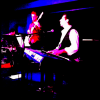
Joe Nero
percussionThe group's version of

George Wallington
piano1924 - 1993

Bud Powell
piano1924 - 1966
Things seemed to become a bit humdrum, but the group grabbed the Mulligan-composed-and-arranged "Venus de Milo" and ran with it, resulting in a top-notch performance of a terrific arrangement. The set concluded with John Lewis' "Rouge." The piece begins with a waltz phrase and then jolts you into a 4/4 swing. Lawton's well-attuned piano comping would have made Lewis happy, and Lawton's solo stayed within the groove while having the one-of-a-kind originality that Lawton brings to every gig.
Following an intermission, the group emphasized the ensemble sound with Gil Evans' arrangement of "Boplicity," a Miles Davis classic using the pseudonym of "Cleo Henry," his mother's name, which he used so that he wouldn't violate a business contract. The flawless way the group executed Gil Evans' chart highlighted its parallel to the first Davis/Evans collaboration album, Miles Ahead (Columbia, 1957) that was released the same year by a different record label, and a 19-piece orchestra. The group performed it in such a coordinated and sophisticated way, that it was undoubtedly the best expression of the "cool" of the evening.

John Carisi
trumpet1922 - 1992
Douglas Mapp
bass"Deception" (Davis; arranged by Mulligan) showed the close connection between bebop, hard bop, and cool, it being virtually an amalgam of the three. By contrast, "Rocker" was totally Mulligan "cool," although Mark Allen's baritone solo had his own more contemporary stamp on it.

Johnny Mercer
composer / conductor1909 - 1976

Johnny Hodges
saxophone, alto1907 - 1970

Paul Arbogast
tromboneMike Zwerin
trumpetb.1930

J.J. Johnson
trombone1924 - 2001
Finally, the one unforgettable vocal arrangement of the album, Jimmy van Heusen's "Darn that Dream," was adapted by Mark Allen from Mulligan's arrangement. Originally sung by Kenny Hagood in a cool, understated style, Philly vocalist
Najwa Parkins
vocalsPersonnel
George Rabbai: trumpet; Ron Kerber: alto saxophone; Mark Allen: baritone saxophone; John David smith: French horn; Paul Arbogast: trombone; Brian Brown: tuba; Tom Lawton: piano; Doug Mapp: bass; Joe Nero: drums; Najwa Parkins: vocalsSet List
Jeru (Gerry Mulligan); Move (Denzil Best; arr. John Lewis); Godchild (George Wallington; arr. Gerry Mulligan); Budo (Bud Powell/Miles Davis ;arr. John Lewis); Venus De Milo (Gerry Mulligan); Rouge (John Lewis); Intermission; Boplicity ("Cleo Henry" aka Miles Davis; arr. Gil Evans); Israel (Johnny Carisi); Deception (Miles Davis; arr. Gerry Mulligan); Rocker (Gerry Mulligan); Moon Dreams (Chummy McGregor/Johnny Mercer; arr. Gil Evans); Darn that Dream (vocal; arr. Gerry Mulligan; adapted by Mark Allen).Tags
Live Review
Miles Davis
Victor L. Schermer
United States
Pennsylvania
Philadelphia
Gil Evans
Gerry Mulligan
Lee Konitz
John Lewis
Gunther Schuller
Claude Thornhill
Adam Lesnick
Tom Lawton
Mark Allen
Denzil Best
George Rabbi
Ron Kerber
Joe Nero
George Wallington
Johnny Carisi
John David Smith
Brian Brown
Doug Mapp
Johnny Mercer
Chummy McGregor
Johnny Hodges
Paul Arbogast
Mike Zwerin
J.J. Johnson
Jimmy Van Heusen
Kenny Hagood} in a cool, understated style, Philly vocalist {{m: Najwa Parkins
Comments
PREVIOUS / NEXT
Support All About Jazz
 All About Jazz has been a pillar of jazz since 1995, championing it as an art form and, more importantly, supporting the musicians who make it. Our enduring commitment has made "AAJ" one of the most culturally important websites of its kind, read by hundreds of thousands of fans, musicians and industry figures every month.
All About Jazz has been a pillar of jazz since 1995, championing it as an art form and, more importantly, supporting the musicians who make it. Our enduring commitment has made "AAJ" one of the most culturally important websites of its kind, read by hundreds of thousands of fans, musicians and industry figures every month.
Go Ad Free!
To maintain our platform while developing new means to foster jazz discovery and connectivity, we need your help. You can become a sustaining member for as little as $20 and in return, we'll immediately hide those pesky ads plus provide access to future articles for a full year. This winning combination vastly improves your AAJ experience and allow us to vigorously build on the pioneering work we first started in 1995. So enjoy an ad-free AAJ experience and help us remain a positive beacon for jazz by making a donation today.

Philadelphia
Concert Guide | Venue Guide | Local Businesses
| More...
Philadelphia Concerts
Sep
10
Wed
Jazz Jam W/ Orrin Evans Featuring Victor North (tribute...
World Cafe Live
Philadelphia, PA
Sep
10
Wed
Livestream: Robert Finley
Sellersville Theater 1894
Sellersville, PA
Sep
10
Wed
Pressed Flower Workshop
The Ware Center
Lancaster, PA
Sep
10
Wed
Bob Beach - The Philadelphia Years
Sellersville Theater 1894
Sellersville, PA
Sep
11
Thu
Janis Ian: Breaking Silence - Film Screening And Q&a...
Sellersville Theater 1894
Sellersville, PA
Sep
11
Thu

Paul Taylor: Live At Unscripted Jazz
South Jazz Club
Philadelphia, PA
Sep
11
Thu

Tim Brey Quintet
Temple Performing Arts Center
Philadelphia, PA
Sep
11
Thu

Bob Devos Dmz Trio
Tavern On George
New Brunswick, NJ
Sep
11
Thu
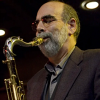
The Len Pierro Jazz Trio
The Ways Restaurant & Brewery
Glenside, PA
Sep
12
Fri

Rev Chris & Les Garçons Crasseux
The Mermaid Inn
Philadelphia, PA

Philadelphia
Concert Guide | Venue Guide | Local Businesses | More...
Sep
10
Wed
Jazz Jam W/ Orrin Evans Featuring Victor North (tribute...
World Cafe LivePhiladelphia, PA
Sep
10
Wed
Livestream: Robert Finley
Sellersville Theater 1894Sellersville, PA
Sep
10
Wed
Pressed Flower Workshop
The Ware CenterLancaster, PA
Sep
10
Wed
Bob Beach - The Philadelphia Years
Sellersville Theater 1894Sellersville, PA
Sep
11
Thu
Janis Ian: Breaking Silence - Film Screening And Q&a...
Sellersville Theater 1894Sellersville, PA
Sep
11
Thu

Paul Taylor: Live At Unscripted Jazz
South Jazz ClubPhiladelphia, PA
Sep
11
Thu

Tim Brey Quintet
Temple Performing Arts CenterPhiladelphia, PA
Sep
11
Thu

Bob Devos Dmz Trio
Tavern On GeorgeNew Brunswick, NJ
Sep
11
Thu

The Len Pierro Jazz Trio
The Ways Restaurant & BreweryGlenside, PA
Sep
12
Fri

Rev Chris & Les Garçons Crasseux
The Mermaid InnPhiladelphia, PA





 Buy Now
Buy Now






